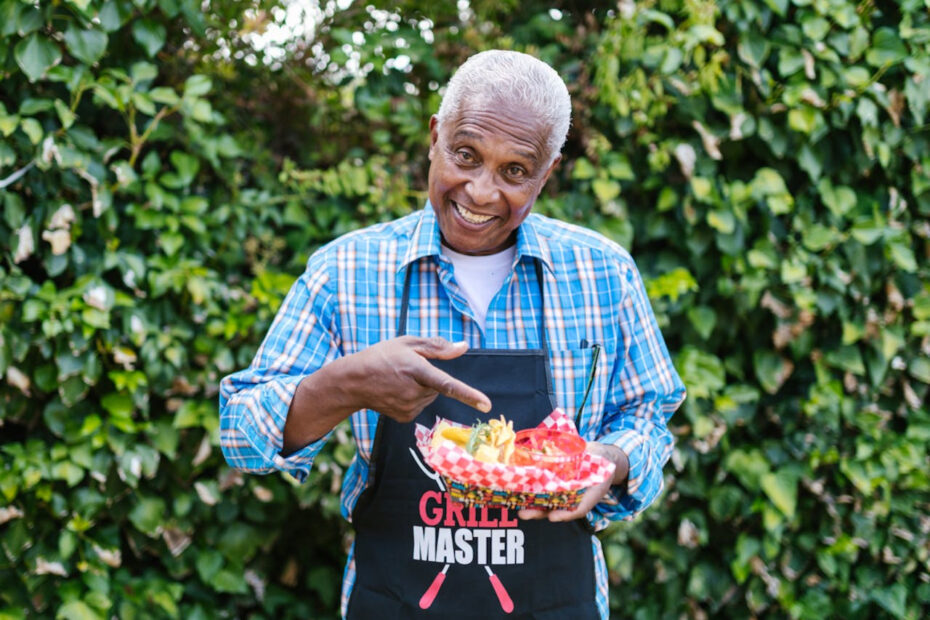Have you ever stopped to consider the profound impact food has on your life? It’s more than just sustenance.
It’s a cultural touchstone, a window into our personal history, and a powerful force shaping who we are. As Anthony Bourdain eloquently stated, “Food is everything we are. It’s an extension of nationalist feeling, ethnic feeling, your personal history, your province, your region, your tribe, your grandma. It’s inseparable from those from the get-go.”
Bourdain’s work transcended ordinary cooking shows. He wasn’t just showcasing fancy dishes; he was revealing the soul of a place through its food traditions and the lives of the people who prepared and savoured it. Our culture, deeply intertwined with food, plays a significant role in shaping our identities. It begs the question: Does the age-old adage “you are what you eat” hold new meaning in retirement?
This blog post delves deeper into this very question. Building upon our previous discussions in “Nutritional Therapy for Seniors – Improving Health and Well-being” and “Lifestyle Factors that May Hold the Key to Prevention of Neurodegenerative Diseases – Part 9,” we’ll explore the multifaceted relationship between food and identity, particularly in the context of retirement.
Consider this: Food for thought – how can we leverage the power of food to create a more fulfilling and enriching life after retirement?
- Uncover the intricate connection between food and culture.
- Explore how dietary choices can influence your well-being.
- Discover how food can be a powerful tool for fostering social connection and sparking joy.
- Learn how to leverage the power of food to embrace a fulfilling and enriching life.
So, buckle up and prepare to have your perspective on food transformed. We guarantee this exploration will leave you with a newfound appreciation for the power this seemingly simple act holds in shaping our lives.
Modern Living Flats

Basic Cottages

Modern Comfort Cottages

Comfortable Frail Care

Food as Fuel for Life: Powering Our Bodies and Minds
Food is more than just something delicious to savour on our plates; it’s the very foundation of our existence. It provides the essential building blocks and fuels our bodies need to function at their best, impacting everything from our physical health to our mental well-being.
The Body Builders: Macronutrients and Micronutrients
Imagine your body as a complex machine. To run smoothly, it requires a variety of components. Food provides these components in the form of macronutrients and micronutrients. Macronutrients, including carbohydrates, protein, and fat, are the fuel sources that give our bodies the energy to perform daily activities. Carbohydrates are broken down into glucose, the primary energy source for our cells. Protein acts as the building blocks for tissues, muscles, and enzymes, while fat provides sustained energy and insulates vital organs.
Micronutrients, encompassing vitamins and minerals, are essential for a wide range of bodily functions despite being required in smaller quantities. They work alongside macronutrients to ensure proper growth, development, and overall health. From calcium for strong bones to vitamin B12 for a healthy nervous system, micronutrients play a crucial role in keeping our bodies functioning optimally.
Fueling Your Well-being: The Importance of Healthy Eating
Just like a high-performance car requires high-quality fuel, our bodies thrive on a diet rich in nutritious foods. Choosing a balanced diet that incorporates a variety of fruits, vegetables, whole grains, lean proteins, and healthy fats provides the essential nutrients our bodies need to stay healthy and prevent chronic diseases.
Here’s how healthy eating impacts our well-being:
- Physical Health: A nutritious diet helps maintain a healthy weight, and reduces the risk of heart disease, stroke, type 2 diabetes, and certain cancers. It also supports a strong immune system, better digestion, and increased energy levels.
- Mental Well-being: Studies have shown a strong link between diet and mental health. Eating a balanced diet can improve mood, reduce symptoms of anxiety and depression, and enhance cognitive function.
Food and Kindness: A Complex Interplay
The connection between food and kindness is a fascinating one, with a more nuanced relationship than a simple cause-and-effect scenario. While hunger can undoubtedly lead to desperation and conflict, it can also foster empathy and compassion. Sharing a meagre meal can be a powerful act of generosity, demonstrating the importance of social connection even in times of scarcity.
Here’s a closer look at the complexity of this connection:
- Hunger’s Paradox: Hunger can have a paradoxical effect, sometimes leading to increased aggression as people compete for scarce resources. However, it can also cultivate empathy and a deeper appreciation for what others have.
- Beyond Food Security: Kindness extends far beyond food availability. Many cultures have traditions of generosity and hospitality, even towards strangers. Acts of selflessness are driven by various motivations, not just the need for food.
- Food as a Catalyst: Perhaps food security creates an environment where kindness flourishes more easily. When basic needs are met, people may have a greater emotional capacity for empathy and compassion.
The debate about whether kindness is innate or learned continues. Food likely influences the expression of this trait, but it’s not the sole factor. Understanding the complex interplay between these concepts can help us foster a more compassionate and supportive society.

Food and Culture: A Tapestry of Flavors and Belonging
Food is more than just sustenance; it’s a vibrant thread woven into the tapestry of our cultures. It connects us to our heritage, evokes cherished memories, and fosters a sense of community.
Food traditions are powerful links to our past. The flavours and dishes passed down through generations become a bridge connecting us to our ancestors. A whiff of grandma’s signature stew or a bite of a dish prepared for a specific cultural celebration can transport us back in time, triggering a flood of warm memories. These traditions not only nourish our bodies but also nourish our sense of belonging.
Shared meals are a cornerstone of social connection. Whether it’s a bustling family dinner or a potluck with friends, these moments of gathering around the table create a space for conversation, laughter, and shared experiences. Food becomes a common language, breaking down barriers and fostering a sense of closeness. In a world where loneliness is a growing concern, shared meals offer a powerful antidote, fostering a sense of community and belonging.
Celebrating Diversity on Your Plate
Retirement communities present a unique opportunity to celebrate cultural diversity through food. Imagine themed dinners showcasing the rich culinary traditions of residents from different backgrounds. Interactive workshops where residents can learn to prepare each other’s signature dishes can be a delightful way to share cultural heritage. These events not only promote understanding and appreciation but also create a vibrant and inclusive environment for everyone.
Food transcends its role on the dinner plate; it can be a powerful tool for cultural and political change.
- Symbols of Identity: Certain foods become synonymous with a particular culture or movement. Think of saffron, a spice deeply woven into Spanish cuisine, or kimchi, a fermented vegetable dish that’s a national staple in Korea. Plant-based diets gaining popularity for environmental reasons are another example of food influencing cultural trends.
- Food and Power Dynamics: Access to food is a powerful tool that can be used for control. Food shortages or restrictions can be employed to exert power over a population group. Conversely, people can use their food choices to make a political statement. Boycotts of certain products or companies highlight social injustices and bring awareness to important issues.
At its core, food is a universal language that transcends borders and cultures. Sharing meals and traditions creates a sense of connection and belonging. Immigrant communities often use food to preserve their heritage in new environments, while trade and travel introduce new ingredients and dishes, leading to exciting cultural fusion and the evolution of cuisines.
Food can also be a powerful tool for protest and social justice movements. Boycotts of products highlight unfair labour practices in agriculture, while campaigns demand better treatment of food workers. Access to affordable and nutritious food is a political issue, and movements work to address hunger and food insecurity through policy changes. Governments can also leverage food as a political tool, using food aid in international relations.
Want to Learn More?
If you’d like to delve deeper into the fascinating connection between food, culture, and politics, here are some resources:
Book: Eating Power: Food, Culture, and Politics [ResearchGate] explores the connection between food and social structures.
https://www.researchgate.net/publication/327833562_Eating_Power_Food_Culture_and_Politics
Article: Tipping the Scales: Examining the Power of Food in International Politics [ResearchGate] discusses how food is used as a political tool. https://www.researchgate.net/publication/261951067_Tipping_the_ScalesExamining_the_power_of_food_in_international_politics
Food and Social Cohesion: A Recipe for Stronger Communities
Food isn’t just about sustenance; it’s a powerful tool for building strong social bonds and fostering a sense of community. Sharing a meal is a universal act that transcends cultures and generations. But what exactly makes breaking bread together so conducive to social cohesion?
The act of sharing food creates a sense of reciprocity and obligation. When we offer a plate of food to someone, we’re essentially saying, “I trust you, and I want to build a connection with you.” This exchange fosters a sense of community and a willingness to help each other in the future. Sharing food security goes beyond the immediate meal; it creates a network of support that can benefit everyone in the long run.
Beyond the Plate: Exploring Deeper Motivations
While food undeniably plays a significant role, is it the sole motivator for cooperation? Evolutionary psychology suggests otherwise. Here are some alternative motivations that might be at play:
- Kin Selection: From an evolutionary standpoint, helping close relatives who share your genes increases the chances of your genetic line surviving. Cooperation, in this case, becomes less about immediate food needs and more about ensuring the group’s long-term survival.
- Altruistic Behavior: Studies suggest humans have a natural capacity for true altruism, where we help others even at a personal cost. This might be driven by empathy, a desire for social approval, or a sense of fairness.
- Long-Term Benefits: Cooperation offers advantages beyond immediate food security. Working together allows us to build shelters, defend against threats, and raise children – all crucial aspects of survival and well-being.
Food as a Catalyst for Cooperation
Perhaps food isn’t the sole driver of cooperation, but rather a powerful tool that facilitates it. Sharing a meal offers several benefits:
- Signalling Trust: Offering food can be seen as a gesture of peace and a willingness to cooperate. It demonstrates that we come in good faith and are open to building relationships.
- Strengthening Bonds: The communal act of sharing food fosters a sense of belonging and shared experience. The act of breaking bread together becomes a ritual that strengthens bonds and creates a feeling of community.
- Celebrating Success: Sharing a meal can be a way to celebrate a successful hunt, harvest, or any collective achievement. This reinforces the value of cooperation and motivates future collaboration.
A Complex Tapestry
While food security undoubtedly creates an environment where cooperation thrives, the desire to cooperate might be a fundamental human trait as well. Our complex social structures suggest that cooperation offers benefits that go beyond basic survival. Perhaps it’s not an “either/or” situation, but rather a complex interplay of factors. Food security creates fertile ground, and our inherent social nature allows cooperation to flourish.
Latest Blog Posts
We often publish new blog posts that deal with various topics ranging from Retirement advice to Bible study.
Visit the Blog Index
Food and Evolution: A Culinary Journey Through Time
Our relationship with food goes far beyond simply satisfying hunger. It’s a story deeply woven into the fabric of human evolution, shaping our bodies, brains, and even societies.
Imagine our ancestors, early hunter-gatherers constantly on the move, seeking out food sources. Their diet likely consisted of a variety of wild plants, animals, and insects. This constant search for sustenance undoubtedly influenced their physical development, favouring traits like agility and stamina.
Fast forward to today, and our food landscape has undergone a dramatic transformation. Modern agriculture and food science provide a vast array of choices, allowing us to focus our energy on pursuits beyond hunting and gathering. However, despite these changes, the influence of food on our biology continues.
Here’s where things get fascinating: food can influence not just our physical bodies but also how our genes are expressed. This field of study is called epigenetics. The choices we make on our plates can essentially “talk” to our genes, turning certain features on or off. While these changes aren’t permanent alterations to the DNA code itself, they can have a significant impact on our health and well-being.
Let’s focus on the positive side of this equation. By making smart dietary choices, we can harness the power of food to promote healthy ageing and potentially reduce the risk of chronic diseases. Diets rich in fruits, vegetables, whole grains, and lean protein provide our bodies with the essential nutrients they need to function optimally. These choices can help us maintain a healthy weight, reduce inflammation, and boost our immune system – all factors that contribute to a longer, healthier life.
A Legacy Written in Food
Think of your body as a living record of your dietary history. Lactose tolerance, for example, is a fascinating example of how food choices have shaped human evolution. Cultures that incorporated dairy products into their diets over generations developed a genetic adaptation allowing them to digest lactose beyond infancy. This ability provided a survival advantage and became more prevalent in those populations.
Food Shapes More Than Just Bodies
Our relationship with food extends beyond physical characteristics. Diets rich in omega-3 fatty acids, for instance, have been linked to improved cognitive function and memory. Even our jaw structure and tooth morphology can be influenced by dietary patterns over time.
Of course, food isn’t the sole driver of human evolution. The environment we live in, the diseases we encounter, and our cultural practices all play a significant role. Think about the impact of fire on cooking techniques or the development of agriculture and its influence on human settlements.
The story of food and evolution is a complex interplay of factors. Yet, there’s no denying the profound impact it has had on shaping who we are as a species. By understanding this connection, we can make informed choices about what we put on our plates, not just for physical sustenance but to fuel our bodies and minds for a fulfilling life, no matter our age.

Food and Personal Expression: A Culinary Canvas for Retirement
Retirement is a time to rediscover passions and explore new avenues for creativity. Food can be a delightful way to express yourself, experiment with flavours, and find joy in the kitchen, whether you’re a seasoned cook or just starting.
Your kitchen can become a canvas for personal expression. Imagine whipping up dishes that reflect your heritage, experimenting with new cuisines, or even creating your signature recipes. Perhaps you’ll host themed dinners, each dish representing a different culture or historical period. The possibilities are endless, and the journey of discovery can be incredibly rewarding.
The act of cooking can be surprisingly therapeutic. The rhythmic chopping of vegetables, the simmering of sauces, and the satisfaction of creating a delicious meal can be a fantastic stress reliever. For those with green thumbs, gardening can offer a similar sense of accomplishment and connection with nature. Harvesting your vegetables and herbs adds a special touch to your culinary creations.
Beyond Sustenance
The statement “you are what you eat” takes on a new meaning in retirement. Food is no longer just about basic sustenance; it becomes a way to express yourself, explore cultures, and connect with loved ones. Here are some ways food transcends the plate:
- Social Norms: While social norms surrounding food certainly exist, retirement allows you to break free from rigid expectations and explore your preferences. You can define your culinary comfort zone, whether it’s mastering gourmet techniques or perfecting the art of simple, home-cooked meals.
- Food as Art: Food has always been intertwined with art. From ancient cave paintings depicting animals to Andy Warhol’s iconic Campbell’s Soup cans, food has served as a muse for countless artists. In retirement, you can explore this artistic connection by plating your dishes with care, experimenting with colours and textures, and taking pride in the visual presentation of your culinary creations.
- Language and Religion: Food is deeply woven into the fabric of language and religion. Special terms and traditions associated with specific dishes connect us to our cultural heritage and spiritual beliefs. In retirement, you can delve deeper into these connections, perhaps learning the history behind your favourite dishes or exploring the role of food in various religious practices.
Food is a Celebration of Life
Food is more than just fuel for the body; it’s a celebration of life, a source of creativity, and a window into different cultures and traditions. Embrace the opportunity to explore this multifaceted world. Let your kitchen be a canvas, your meals an expression of self, and food a source of joy and connection.
Food Beyond Sustenance: A Journey of Flavor, Connection, and Purpose
Food nourishes our bodies, and that much is certain. But its significance extends far beyond mere nutrition. Food is a powerful cultural force, a bridge that connects us to our heritage, traditions, and communities. It’s a language that transcends borders, fostering a sense of belonging and shared experience. The act of sharing a meal becomes a ritual, a time for conversation, laughter, and connection.
Purpose and Fulfillment
Food can also play a vital role in maintaining a sense of purpose and fulfilment in life. Learning a new cuisine, mastering a complex recipe, or simply cultivating a home garden can all be incredibly rewarding experiences. The act of cooking becomes a creative outlet, allowing us to express ourselves through flavour and presentation.
Sharing the fruits (and vegetables!) of our labour with loved ones adds another layer of satisfaction. Whether it’s planning themed dinner parties for friends or teaching your grandchildren family recipes, food offers opportunities to connect, share knowledge, and create lasting memories.
The world is a vast culinary landscape, brimming with diverse flavours and cooking techniques just waiting to be explored. Here are some ways to embark on your own delicious adventure:
- Travel with an Open Mind: If you have the opportunity to travel, embrace the local cuisine! Step outside your comfort zone and try new dishes. Talk to local chefs and food vendors, and learn about the ingredients and traditions behind the food.
- International Grocery Stores: Many cities have international grocery stores that stock a wide variety of ingredients from around the world. Explore these stores, pick up some unfamiliar items, and find recipes online for inspiration.
- Cooking Classes: Cooking classes offer a fun and interactive way to learn new skills and cuisines. Take a class on Thai curries, French pastries, or anything that piques your interest. You’ll not only learn new techniques but also meet other food enthusiasts.
Food: A Celebration of Our Shared Humanity
The late Anthony Bourdain’s approach to food television perfectly exemplifies the profound impact of food beyond the plate. His shows weren’t just about showcasing exotic dishes; they were about the people behind the food, the stories woven into each meal. He connected with local chefs, residents, and fellow travellers, creating a sense of shared humanity through the universal language of food.
Undoubtedly, food plays a significant role in shaping our health and well-being. However, it’s just one thread in the rich tapestry of our experience. Our values, relationships, and the experiences we have throughout life all contribute to who we are. Food is a powerful force, but it doesn’t define us entirely.
While we’ve delved into the cultural and social aspects of food, let’s not forget its fundamental role in our physical well-being:
- Cellular Function: Food provides the building blocks and fuel for every cell in our body. Without proper nutrition, our organs wouldn’t function, and we wouldn’t survive.
- Mental Processes: Our brains require a steady supply of energy from food to think clearly, learn, and remember. Deficiencies in certain nutrients can lead to cognitive decline and mental health issues.
- Physical Activity: Food provides the energy for our muscles to move and work. Without it, we’d be lethargic and unable to perform even basic tasks.
- Reproduction: Proper nutrition is essential for healthy reproduction in both men and women. Diets lacking essential nutrients can lead to infertility and pregnancy complications.
So, while food offers a delicious journey of discovery, connection, and purpose, it also serves as the very foundation of our physical well-being. It’s a powerful force that nourishes our bodies, minds, and spirits.
Modern Living Flats

Basic Cottages

Modern Comfort Cottages

Comfortable Frail Care

The “Whole” Story: Food for Body, Mind, and Spirit
In conclusion, food is much more than just something we eat to satisfy hunger. It plays a vital role in our physical health, providing the building blocks and fuel for our bodies to function properly. But food also nourishes our minds and spirits. It connects us to our cultural heritage, strengthens social bonds through shared meals, and can even be a source of creativity and enjoyment. Whether you’re looking to improve your diet or simply explore new flavours, there are endless possibilities when it comes to food.
Thank you for joining us on this exploration of the many facets of food. We hope you found this information informative. At La Gratitude Homes, we understand the importance of healthy eating for our residents. We offer a variety of delicious and nutritious meals, and our staff can help you create a personalized dining plan that meets your needs and preferences. To learn more about our dining options, please visit our website or contact us directly.
As the writer E.B. White once said, “Food is not rational. Food is culture, habit, craving and identity.” Let’s embrace the power of food to nourish our bodies and connect us to the world around us.
Citation:
“Food is everything we are. It’s an extension of nationalist feeling, ethnic feeling, your personal history, your province, your region, your tribe, your grandma.” – Anthony Michael Bourdain was an American celebrity chef, author, and travel documentarian. He starred in programs focusing on the exploration of international culture, cuisine, and the human condition. Wikipedia
Thank you for your continued support, we appreciate your likes, follows and retweets on Facebook, Twitter, Pinterest and LinkedIn. Make sure to share this post with friends and family.
You can make a difference
With your assistance, the volunteers at La Gratitude will be able to take better care of not only the residents at the old age home but also the greater Newcastle community. La Gratitude is constantly involved in outreach projects to help the elderly in need in and around Newcastle.
Your donations will be greatly beneficial in the provision of food and other basic necessities for the less fortunate elderly people that require assistance.
Donating is easy, click here to donate now.







